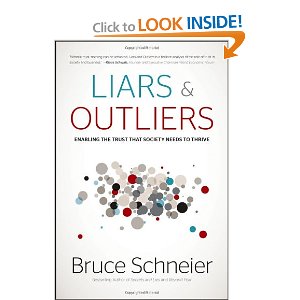
Bruce Schneier
Robert Steele: This review is so useful that it is being cross-posted to Phi Beta Iota the Public Intelligence Blog. Both this book and its virtual sidekick, The Penguin and the Leviathan: How Cooperation Triumphs over Self-Interest completely miss the point of Statecraft as Soulcraft, of The Exemplar: The Exemplary Performer in the Age of Productivity and Philosophy and the Social Problem: The Annotated Edition. It's about education. How a society educates EVERYONE is the ultimate foundation for transparency, truth, and trust (the subtitle of my most recent book, THE OPEN SOURCE MANIFESTO. Education is the soul of a direct democracy, and the primary enabler of pervasive voluntary reciprocal trust.
![]() It's not you, it's me. Great book, but I didn't enjoy it.,June 7, 2012
It's not you, it's me. Great book, but I didn't enjoy it.,June 7, 2012
By K. McCauley “I'm the one they call when things go wrong.”
I'm a Bruce Schneier fan. I read his blog regularly and I think he's one of the smartest and most forward thinking security experts working today. I bought this book without even looking.
Perhaps I should have. It wasn't what I expected and because of that, I was let down and disappointed. Which reflects in my low rating. It's certainly a well written book and well researched and makes very good points. Too bad it wasn't very interesting to me.
Schneier normally writes about security, and his blog is pretty much only about security. He talks a lot about how we fail dramatically at security, using irrational emotional responses rooted in our evolutionary past to respond to statistically unlikely threats today. I find this extremely interesting, as I think our overreaction to things like 9/11 have caused us a great loss of time, money, and freedom. I also think that it's actually made us less safe by focusing on events and attacks that will probably never happen and exposing us to attacks that always do. For instance, many of us choose to drive today, either out of fear of terrorism or the hassle of dealing with the TSA. This is a much more dangerous mode of travel, and as a result, the increased traffic load has killed more people each year than died on 9/11.
But that's not what this book is about. It's about trust. It's about how we evolved trust and how society uses rules to enforce it. It talks about why we can allow a plumber in our home and reasonably know that even though he's a stranger, he's not going to rob us. It talks about how he can take money from us (or a check) and know that it's not counterfeit and that the bank or the government will honor the valuation of it. A little different focus than I expected, and unfortunately, I never engaged with the book. I don't know if it's because I ultimately found the information presented to be dry and boring or if I just kept expecting the Bruce Schneier I know and love from his blog to eventually show up. I finished the book, but I didn't enjoy it.
That's really a shame. I feel the book deserves more than three stars. You might really enjoy it. There's nothing I can say that's wrong with the book because it is expertly crafted, holds very deep and insightful information, and yet is very easy to understand. That's very difficult, and I even gave the book an extra star just because I don't underestimate how difficult it is to write a very technical and complex book in language that just about anyone can understand. Few authors can achieve that. However, this is my review, not someone else's. The fact is, I just didn't enjoy the book and I won't be re-reading it. For that reason alone, I really can't give it more than three stars. I'm very sorry Bruce. If I ever cross paths with you, I hope you won't hold it against me.
I should have read Beyond Fear, honestly, as that appears to be the book I thought I was reading.




